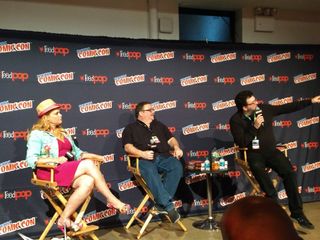'The Fifty-Year Mission': Authors Recount Strange 'Star Trek' History

"Star Trek" is a dramatic, exciting saga with a diverse cast of characters that's taken more than 50 years to unfold. As it turns out, so is the story behind making "Star Trek."
"The Fifty-Year Mission" (Thomas Dunne Books, 2016), by Ed Gross and Mark A. Altman, is a two-volume doorstopper of a book that chronicles the oral history of "Star Trek," from the first unsuccessful voyage of the starship Enterprise under Capt. Pike, to the latest adventures of Michael Burnham that currently stream on the digital channel CBS All Access. As it turns out, the franchise wasn't guaranteed to last a year, much less 50.
I attended a panel about the history of "Star Trek" at New York Comic Con on Oct. 5. Altman and Gross hosted the panel, and invited Chase Masterson, who played Leeta on "Deep Space Nine," along to offer her thoughts as a primary source. [The 15 Best Ships on Star Trek, from V-ger to the USS Vengeance]
The panel didn't have a single unifying theme; instead, the speakers spun yarns from every era of "Trek." (To their credit, Altman, Gross and Masterson did try to focus the discussion early on. They polled the audience to see how many fans wanted to talk primarily about the original series, "The Next Generation," "Deep Space Nine," "Voyager" or "Enterprise." The result was an almost total deadlock.)
Since Masterson was there, and "Deep Space Nine" is going through something of a resurgence right now, the adventures of Capt. Sisko and crew took center stage, at least for a little while. Gross explained that while serialized TV is the default today, it was a daring experiment back in the '90s. "Trek" writers and producers had to fight tooth and nail for continuity on "The Next Generation," to say nothing of the ongoing "miss-one-episode-and-you're-lost" structure of "Deep Space Nine."
Masterson, though, said that she and a lot of other cast and crew members knew that "Deep Space Nine" would have its day when technology caught up with its storytelling style.
"The show will go over better when people can watch it all at once," she remembers saying.
Get the Space.com Newsletter
Breaking space news, the latest updates on rocket launches, skywatching events and more!
Masterson also took some time to discuss how "Star Trek" has been a powerful force for social change, and how it prompted her to apply the show's message in real life. Taking inspiration from the Vulcan belief of IDIC ("Infinite Diversity in Infinite Combinations"), she founded the Pop Culture Hero Coalition to combat bullying in schools. The group is an "anti-racism, anti-misogyny, pro-LGBT" outfit that "uses pop culture stories to teach kids," Masterson said.
From "Deep Space Nine," the conversation wound the clock back a few decades. The 1970s were a fallow period for "Trek," which began with little of note aside from the uneven Animated Series (and a very weird anti-drug PSA). During the decade, two high-profile "Trek" projects almost came to fruition, the first of which was a film called "Planet of the Titans." The concept featured a time-travel plot that sent the Enterprise crew back in time, sharing fire with early man, hence the "Titans" moniker. The most interesting thing about the film was the redesign of the Enterprise, which looks an awful lot like the more recent USS Discovery.
The other project was a TV series known as "Star Trek: Phase II." Fans have known about "Phase II" for decades, and they're still uncertain whether it would have been a worthy follow-up for the original series or a short-lived disaster. The show would have combined some of the original cast members with the new character Xon (a full-blooded Vulcan replacement for Spock), as well as William Decker and Ilia, who showed up in "Star Trek: The Motion Picture." [What I Learned by Watching Every 'Star Trek' Show and Movie]
In fact, Paramount's decision to make a feature film was what stopped "Phase II" in its tracks. "The Motion Picture" very nearly didn't happen, however. In May 1977, Paramount issued a statement to the "Star Trek" crew: "We don't believe there's a future in science-fiction."
Two weeks later, "Star Wars" came out.
"The Motion Picture" is a divisive film, as some fans adore its high-concept story and satisfying resolution, while others decry its lack of action and bloated runtime. Either way, it could have been much weirder: Early drafts featured Capt. Kirk punching an alien masquerading as Jesus Christ, Gross said. The movie's novelization, which Gene Roddenberry tackled himself, is full of bizarre tangents about sex and consciousness.
In fact, although Roddenberry is rightfully remembered as the father of all things "Star Trek," he wasn't necessarily always the best influence on anything past the original series, Gross and Altman argued.
"Gene was afraid that Paramount would take 'Trek' away from him after the '70s," Gross said. Ultimately, though, "Roddenberry got his own way, just as George Lucas got his own way with 'Star Wars.'" That control wound up hurting some of the early seasons of "The Next Generation," in which Roddenberry insisted retreading original series stories with an extremely nonconfrontational new cast.
There wasn't much time left in the panel to discuss "Voyager," but Gross did share one story about the infamous tension between the actors Kate Mulgrew and Jeri Ryan. The behind-the-scenes drama on the later seasons of Voyager was intense: Mulgrew felt that Ryan was usurping her position as the most important character in the show, particularly since the showrunners played up Seven of Nine's sex appeal. It's no secret that Mulgrew took out a lot of her frustrations on Ryan, to the point where Ryan did not want to even show up on set.
When Gross interviewed Mulgrew for his book, he wondered whether the actress would try to downplay her bad behavior. Instead, she was "totally straightforward and apologetic," according to Gross. The two actresses aren't likely to be good friends anytime soon, but things have come a long way since the '90s.
As the discussion ended, the three panelists looked toward "Discovery," and how the new show might fit into the larger "Star Trek" canon. Masterson believed that its dark tone and serial nature took a lot of inspiration from "Deep Space Nine."
"['Deep Space Nine'] is about boldly going into ourselves," she said. "What type of friend are we? What type of enemy are we?
"IDIC is 'Star Trek's' most important theme today," she concluded. "And yes, that is political."
Follow us @Spacedotcom, Facebook and Google+. Original article on Space.com.
Join our Space Forums to keep talking space on the latest missions, night sky and more! And if you have a news tip, correction or comment, let us know at: community@space.com.

Marshall Honorof is a senior editor for Tom's Guide, overseeing the site's coverage of gaming hardware and software. He comes from a science writing background, having studied paleomammalogy, biological anthropology, and the history of science and technology. After hours, you can find him practicing taekwondo or doing deep dives on classic sci-fi.
Most Popular

